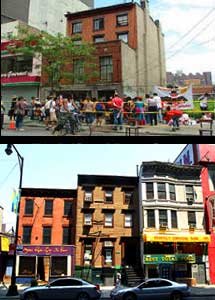
The Brooklyn Rail just published "
The Case Of The Duffield Street Homes." The article discusses current issues, and says this about the Truesdell family, 19th century residents of 227 Duffield:
Thomas and Harriet Truesdell were veterans of the abolitionist movement by the time they moved from Rhode Island to Brooklyn in 1850. Thomas was a delegate to the 1836 Rhode Island Anti-Slavery Convention. He donated to the American Anti-Slavery Society, and subscribed to the National Anti-Slavery Standard. His wife, Harriet, sat on the planning committee of the 1838 Anti-Slavery Convention of American Women.
The Truesdell’s neighbors included officers in the Underground Railroad and the anti-slavery New York State Vigilance Committee, and other abolitionist eminences such as William Lloyd Garrison and Reverend Henry Ward Beecher. The guns that the Reverend was then sending to anti-slavery militias in Missouri, Kansas and Nebraska were called “Beecher’s Bibles.”
The article also describes the physical evidence that didn't fit into the city's narrative. For more images of the basement and their significance, click
here.
 The Brooklyn Rail just published "The Case Of The Duffield Street Homes." The article discusses current issues, and says this about the Truesdell family, 19th century residents of 227 Duffield:
The Brooklyn Rail just published "The Case Of The Duffield Street Homes." The article discusses current issues, and says this about the Truesdell family, 19th century residents of 227 Duffield: